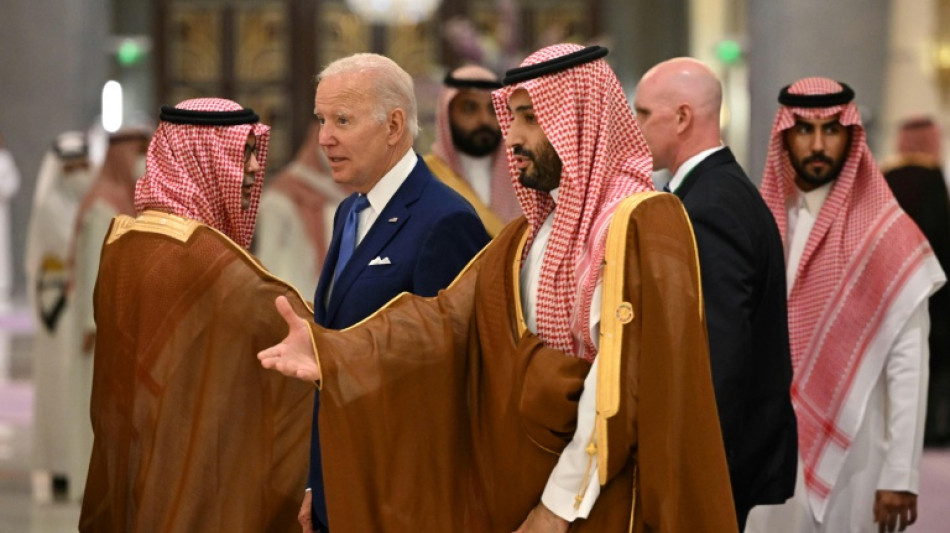
| RBGPF | 1.48% | 69.02 | $ | |
| RYCEF | -18.79% | 8.25 | $ | |
| RELX | -6.81% | 48.16 | $ | |
| NGG | -5.18% | 65.97 | $ | |
| SCS | -0.42% | 10.695 | $ | |
| CMSC | 0.27% | 22.32 | $ | |
| GSK | -6.82% | 36.52 | $ | |
| BTI | -5.14% | 39.87 | $ | |
| RIO | -6.9% | 54.66 | $ | |
| BP | -10.37% | 28.395 | $ | |
| BCC | 0.81% | 95.4 | $ | |
| VOD | -10.24% | 8.5 | $ | |
| JRI | -7.55% | 11.92 | $ | |
| BCE | 0.26% | 22.72 | $ | |
| AZN | -7.98% | 68.46 | $ | |
| CMSD | 0.79% | 22.85 | $ |

US won't 'walk away' from Middle East, Biden tells Arab leaders
US President Joe Biden told Arab leaders on Saturday that Washington would remain fully engaged in the Middle East and would not cede influence to other world powers.
"We will not walk away and leave a vacuum to be filled by China, Russia or Iran," Biden said during a summit in Jeddah, on the Red Sea coast of Saudi Arabia.
US ties to Gulf powers in particular have been roiled by multiple issues in recent years, notably Washington's push for a deal to curb Iran's suspect nuclear programme and its tepid response to attacks on Saudi oil facilities in 2019 claimed by Yemen's Iran-backed Huthi rebels.
The summit, the final stop of Biden's Middle East tour, brings together the six members of the Gulf Cooperation Council as well as Egypt, Jordan and Iraq.
Biden had been looking to use the trip to discuss volatile oil prices and outline his vision for Washington's role in the region.
On Friday he met Saudi King Salman and Crown Prince Mohammed bin Salman, the kingdom's de facto ruler who US intelligence agencies assess "approved" the 2018 operation that killed journalist Jamal Khashoggi.
After a fist-bump with Prince Mohammed, Biden said he raised the Khashoggi case and warned against future attacks on dissidents.
Prince Mohammed, who chaired the opening of Saturday's summit, has denied any role in the death of Khashoggi, who was dismembered in the kingdom's Istanbul consulate and whose remains have never been found.
Biden told the assembled Arab leaders that "the future will be won by countries that unleash the full potential of their populations... where citizens can question and criticise leaders without fear of reprisal".
- Ukraine tensions -
Biden said the United States would commit $1 billion in food aid to the Middle East and North Africa amid rising food insecurity induced by the war in Ukraine.
Russia's invasion of Ukraine has exposed a once unthinkable divergence between Washington and key Middle East allies Saudi Arabia and the United Arab Emirates, the oil giants that are increasingly independent on the international stage.
The wealthy Gulf nations, which host US forces and have dependably backed Washington for decades, have notably refrained from supporting the Biden administration as it tries to choke Moscow's lifelines, from energy to diplomacy.
Analysts say the new position reveals a turning point in Gulf relations with the US, long the region's protector against neighbour Iran.
But Saturday brought some conciliatory gestures, with Biden inviting his Emirati counterpart, Sheikh Mohamed bin Zayed Al-Nahyan, to visit the White House before the year is up.
And in his remarks at the summit, Saudi Prince Mohammed said he hoped it would "establish a new era of joint cooperation to deepen the strategic partnership between our countries and the United States of America, to serve our common interests and enhance security and development in this vital region for the whole world."
- Push for oil -
Riyadh and Washington on Friday signed 18 agreements on areas including energy, space, health and investment, including developing 5G and 6G technology, said a Saudi statement.
A separate joint statement said the two countries noted "the importance of their strategic economic and investment cooperation, especially in light of the current crisis in Ukraine and its repercussions, reiterating their commitment to the stability of global energy markets."
Saudi Arabia agreed to link the electricity networks of the Gulf Cooperation Council to Iraq, which relies heavily on energy from Iran, "in order to provide Iraq and its people with new and diversified electricity sources," the White House said.
Washington wants Riyadh to open the oil floodgates to bring down soaring gasoline prices, which threaten Democratic chances in November mid-term elections.
But Biden on Friday tried to tamp down expectations that his trip would yield immediate gains.
"I'm doing all I can to increase the supply for the United States of America," he said, adding concrete results would not be seen "for another couple weeks".
- Israeli ties -
White House officials have used the trip as a bid to promote integration between Israel and Arab nations.
The issue of the strategic Red Sea islands of Tiran and neighbouring Sanafir was also expected to be on Saturday's agenda.
Egypt ceded the islands in 2016 to Saudi Arabia, but the deal requires Israel's green light -- a move that could spur contacts between the Jewish state and Riyadh.
Biden said Friday that a decades-old multinational peacekeeping force, including US troops, would leave Tiran, with the White House adding they would depart by the end of the year.
Saudi Arabia has refused to join the US-brokered Abraham Accords which in 2020 created ties between Israel and two of the kingdom's neighbours, the United Arab Emirates and Bahrain.
R.Schiltz--LiLuX



